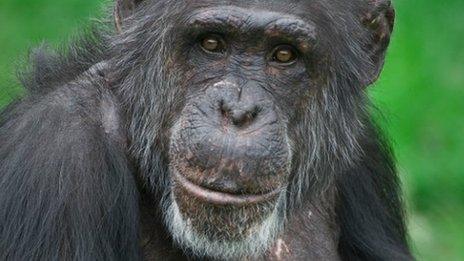Animal behaviour in the boardroom
- Published

Do your boss and this primate have something in common?
Monkey business might mean mucking around, but some companies are finding inspiration in the chimp world.
Chester Zoo has started opening its cages to local businesses so they can observe the beasts, then ape it in the boardroom in the first management course of its kind in the UK.
Leading a group of business people around the zoo, Dutch biologist-turned-leadership expert Patrick van Veen explains they are taught how primitive behaviour is still alive and well in the workplace.
By observing monkeys and apes, the premise is that they will start to understand their colleagues better, he says.
And as Chester plays host to one of the world's largest and most successful groups of zoo chimpanzees, there is a lot of material to work with.
Mr Van Veen already runs successful courses in Germany, Belgium and Holland - and says that attitudes towards management can vary across Europe.
"It's very easy to talk about behaviour in the Netherlands, but very difficult in Belgium," he says.
"When you are in Germany, they are extremely hierarchical, so you have to use special words to address the boss and name him properly - you always have to use a proper title.
"But in Germany they are very open-minded about changes in management style. In the Netherlands they are not."
Serious science
Mr Van Veen started the business because he felt that he had really benefitted from his background training in primate behaviour in his first job, working for an insurance company.
Understanding monkeys helped him get a handle on relationships between people at work, he says.
He was particularly inspired by his boss, who reminded him of a gorilla.
"He was about two metres tall, he was huge, and he had small glasses," Mr Van Veen recalls. "When you entered his office, he'd stare at you over them. He really was a gorilla."
Ape Management combines Mr Van Veen's two passions. "I love to study primates and I also love to study humans," he says. "There was no company doing that, so I had to start my own".
It might be a new idea for a business, but the theory behind it is well known.
"There's only a 1.4% difference in genetic material between humans and chimpanzees," Sonya Hill, a research officer at Chester Zoo, points out.
"It has a serious scientific backing. It's so important that it's got a fun side, but that it's based on good science in terms of chimp behaviour."
Dr Hill says she has always noticed the similarity been human and chimp behaviour, also in terms of grooming.
"It's a really important behaviour for primates and, of course, humans are primates too," she says.
"We groom each other socially, communicating with your friends and making sure in a work environment that you find out about your colleagues. By watching your colleagues, you can start to understand how you interact with one another, how you use communication in the workforce to get on better".
Who is grooming whom?
The mainly female audience of business people attending the course nod violently when Mr Van Veen describes how most offices have a set of dominant males, who slap each other's backs, stamp their feet and draw themselves up tall.
He says that humans can learn from monkeys "when power works, when hierarchy works - and when dominance is not effective". We often make assumptions about one another, without trying to understand why a colleague is behaving in a certain way, he says.
The business people on the course certainly see similarities between the chimps and people they know.
"I found it really fascinating," says Sandra Bruce who works for bank NatWest.

Patrick van Veen explains how animal behaviour can apply to people
"I think one of the things I really took away was how, when we see different behaviours, how we put those into categories instead of just watching the behaviour and trying to understand it.
"We put people into little niches as to how we think they're going to behave."
Ms Bruce plans to put some of the theory into practice. "When I go back to the workplace, it's really about observing people more and not immediately putting them into boxes," she says.
"The organisation is about people and they're the most important part, so it's really about understanding the people that work for you."
Watching the monkeys grooming one another, Mr Van Veen emphasises the importance of this kind of supportive behaviour at work.
"We spend a lot of time in chit-chat, drinking coffee with each other," he says. "That's grooming behaviour, like primates do."
He says managers might neglect to do this sometimes, but it is a vital part of keeping a happy workplace environment.
Watching this interaction can give you an understanding of the politics at play. So next time you want to see who is really King Kong in your office, play close attention to just who is grooming whom.